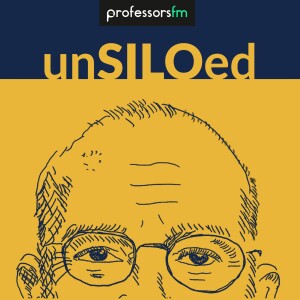
238. Walling Versus Bridging feat. Glenn Hubbard
 2023-01-25
2023-01-25
Growth is good but creates losers as well as winners. The Economics profession has far too often failed to provide insight into how to design policies that protect those negatively impacted by forces such as technological change and globalization.
There’s a lot riding with how we address the economic ‘losers’, and it matters because the two main ways to engage with this problem have dramatically different consequences.
Glenn Hubbard is an author, economist, and also Professor of Economics as well as Dean at the Columbia University Graduate School of Business until his retirement in 2019. Glenn was also the Deputy Assistant Secretary at the U.S. Department of the Treasury and Chairman of the Council of Economic Advisers. Glenn’s latest book is The Wall and the Bridge: Fear and Opportunity in Disruption’s Wake, and he tackles the two main ways to assist the ‘losers’ in life. Governments and establishments try to wall off the affected areas and protect them from further harm, but at great cost to and minimal benefit for those people affected. Glenn promotes the second strategy of building bridges out from the areas of loss in different directions as lifelines, serving to assist in whatever transition needs to be made to reach a working position.
Glenn and Greg talk about the two approaches to disruption, walls, which seek to keep change at bay, and bridges, which make change easier to accept. They discuss how Lincoln and Roosevelt built bridges through Land Grant Colleges and the GI Bill and how current policymakers could build new bridges to opportunity. . Glenn explains the role of community colleges and labor mobility and local development initiatives in places like Pittsburgh, PA, and Youngstown, OH.
Episode Quotes:Why business leaders should step outside their comfort zone
41:18: Many business people think that there's enormous and widespread support for business in the system. And so we can just tinker around the edges and ignore the social support. (41:48) I do think business leaders have to step outside their comfort zone a little. I don't think social support is given, and I do think they have to think of themselves as somewhere, not anywhere.
On being optimistic about the future of economic growth
49:07: Markets and the market for ideas have a great capacity to solve our problems. Where we trip over ourselves is when we don't notice the consequences of things, but a perfectly alert group of economists, businesspeople, public policymakers, and citizens—real people as well as economists—can make this work.
Growth and economic development
03:16: Imagine in my hand, I had a coin, and the head side of that coin is called growth. Now, who wouldn't be for that? Here's the problem: There's no modern theory of economic growth that doesn't entail a tail side of the coin, which is disruption. Every modern theory of growth has it. There's no such thing as growing a little bit each year smoothly, and everybody's incrementally better off. That's not how economic growth happens.
Why isn't the congress the political realm where deals take place?
26:56: Elites, whether they sat in boardrooms, congressional halls, or, dare I say, the economics profession, weren't noticing that we were speaking more to people who won. And not enough the people who lost and the anxiety that creates for individuals and communities. So I think noticing is a big element of it.
Show Links:Recommended Resources:- Robert D. Putnam
- Adam Smith
- The Great Transformation: The Political and Economic Origins of Our Time
- Kaldor-hicks efficiency
- Mancur Olson
- Faculty Profile at Columbia Business School
- Professional Profile on National Bureau of Economic Research
- Professional Profile on Committee on Economic Development
- Glenn Hubbard’s Website
- Glenn Hubbard on LinkedIn
- The Wall and the Bridge: Fear and Opportunity in Disruption's Wake
- Balance: The Economics of Great Powers from Ancient Rome to Modern America
- The Mutual Fund Industry: Competition and Investor Welfare
- HEALTHY, WEALTHY, AND WISE: Five Steps to a Better Healthcare System (second edition)
- Seeds of Destruction: Why the Path to Economic Ruin Runs Through Washington, and How to Reclaim American Prosperity
- The Aid Trap: Hard Truths About Ending Poverty
More Episodes
 2023-06-19
2023-06-19
 2023-06-16
2023-06-16
Create your
podcast in
minutes
- Full-featured podcast site
- Unlimited storage and bandwidth
- Comprehensive podcast stats
- Distribute to Apple Podcasts, Spotify, and more
- Make money with your podcast
It is Free
- Privacy Policy
- Cookie Policy
- Terms of Use
- Consent Preferences
- Copyright © 2015-2024 Podbean.com





